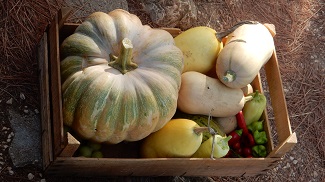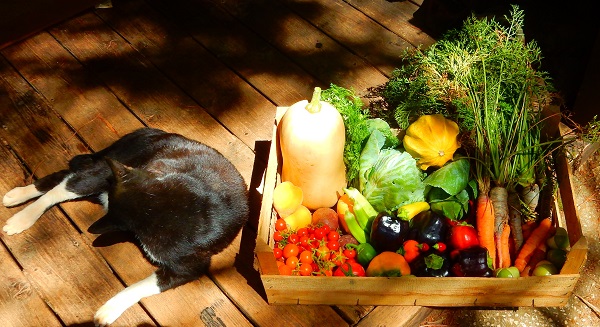The food choices you make are a personal matter, which involves things like taste, culture, pleasure, community and health. Nowadays, there are lots of different opinions and schools of thought concerning diet, with often contradicting information. The one point of consensus being that eating more fruit and vegetables is good for your health.
We also know for sure that people who eat a Western diet, high on sugar and processed foods, suffer substantially higher rates of cancer, cardiovascular disease, diabetes and obesity than people eating any kind of traditional diet. The basic principle of a healthy diet is very simple. You shouldn’t eat too much calories and get a big part of your calories from vegetables, fruits and starches. Not eating too much calories implies not eating too much fat, because fats are high in calories and add no bulk to your diet.
 Appetite satisfaction begins with physically filling the stomach. Compared to oil and fats which contain 9 Calories per gram, starches contribute only about 1 Calorie per gram. This implies that a starch based meal will lead to hours of satiety, while oil and fats will give you loads of calories and leave you feeling hungry. The fat that you eat adds easily to your body-fat. After a meal, tiny fat particles enter the bloodstream, and with relatively little change they can be packed in your fat cells. Another problem with fat is that it can slow your metabolism, which would make you gain weight. This effect of fat occurs because fat particles that are stored inside a cell impair the working of the cells mitochondria, which are the energy burners in your cells.
Appetite satisfaction begins with physically filling the stomach. Compared to oil and fats which contain 9 Calories per gram, starches contribute only about 1 Calorie per gram. This implies that a starch based meal will lead to hours of satiety, while oil and fats will give you loads of calories and leave you feeling hungry. The fat that you eat adds easily to your body-fat. After a meal, tiny fat particles enter the bloodstream, and with relatively little change they can be packed in your fat cells. Another problem with fat is that it can slow your metabolism, which would make you gain weight. This effect of fat occurs because fat particles that are stored inside a cell impair the working of the cells mitochondria, which are the energy burners in your cells.
Starches are also referred to as complex carbohydrates, they consist of long chains of glucose molecules which we can break down into simple sugars that provide us with sustained energy and keep us feeling full and satisfied. Other forms of carbohydrates are cellulose, which are chains of glucose bonded together by indigestible linkages that our digestive system cannot break down but are valuable as dietary fibre, and simple sugar molecules as sucrose, fructose, lactose and glucose. Plants make starches to store energy in the same way as we store energy as glycogen. Sources of starch are whole grains, unrefined flours, root vegetables, winter squashes and legumes, like beans, lentils and peas.
It’s also best to stay away from refined sugar because these are empty calories. They have calories but contain no nutrients. When we consume too much of these empty calories it will lead to a nutritional imbalance that weakens the body’s defence and repair system. We find these calories from fat and sugar a lot in processed foods, which also often contain high amounts of salt.
High amounts of salt in your diet are linked to adverse health outcomes, like high blood pressure. Salt is rapidly absorbed into the bloodstream after a meal, which makes your blood more salty. The bodies answer to this is diluting the blood by adding water, which it takes from the kidneys and that’s the reason why eating something salty makes you thirsty. Adding more volume into your bloodstream makes the pressure go up. Salt tends to hold water in your blood and tissue which can increase your weight with several kilo’s. Another problem with salt is that it makes food extra palatable, which in turn makes us inclined to eat more. Salt is an essential nutrient but you could get all the salt you need from plants, which all contain small amounts of sodium. A good guideline to keep is too consume not more than 1 mg of salt for each calorie that you consume.
 When possible, try to purchase organic produce. The organic label means that the farmer has been inspected and adheres to organic farming practices without pesticides. Pesticide free produce may not look as pretty, but if you want fewer pesticides it’s better to buy organics. Maybe even more important is that organic farming doesn’t create any environmental problems and reduces the pollution of air, water, soil and food.
When possible, try to purchase organic produce. The organic label means that the farmer has been inspected and adheres to organic farming practices without pesticides. Pesticide free produce may not look as pretty, but if you want fewer pesticides it’s better to buy organics. Maybe even more important is that organic farming doesn’t create any environmental problems and reduces the pollution of air, water, soil and food.
To know your local farmer and buy his locally grown produce is also a good choice, because his produce will be fresher. In the supermarket, fresh refers to food that spoils faster. It doesn’t mean that foods were picked earlier that day, or even that week. Frozen fruit and vegetables can be a better option in the supermarket, especially when they are flash frozen immediately after harvesting. Deterioration begins directly after harvest and freezing slows this process down. There is some loss of vitamins by freezing the produce, but this is not much. Frozen produce can contain more nutrients than fresh produce that’s a week old.
It’s your daily diet that counts towards sustainable health and weight loss, and the occasional exception isn’t going to ruin your health. Problems arise when you have a bunch of exceptions in a day, week or month to become a pattern of eating. The best thing to do to permanently overcome an unhealthy body weight is to redirect your focus from weight to health. When health becomes the top priority in food selection, overall body weight responds predictably in a positive direction. And any movement along the spectrum towards healthy eating, can accrue significant health benefits.

